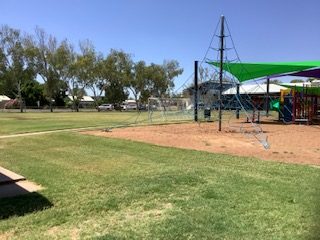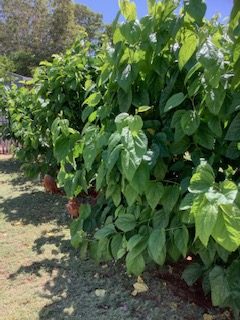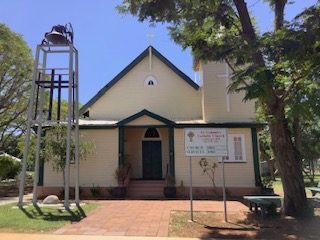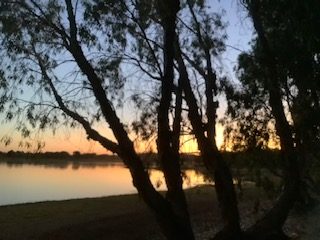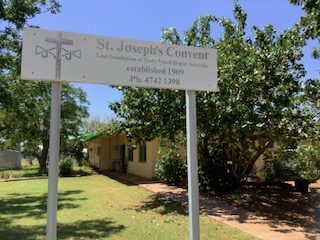Birth of Fr Julian Tenison Woods
November 15, 2020From Southwark, England to Southport, Tasmania.
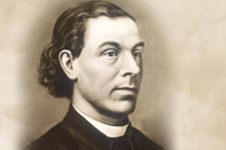 On 15 November 1832 in Southwark, England, Henrietta St Eloy Tenison, wife of James Dominick Woods, gave birth to a son, Julian Edmund Tenison Woods.
On 15 November 1832 in Southwark, England, Henrietta St Eloy Tenison, wife of James Dominick Woods, gave birth to a son, Julian Edmund Tenison Woods.
As in any family the birth of a child is received with great joy and perhaps even wonder at what this child might do with his God given life.
In the decade of the 1830’s the world saw a rise of imperialism and colonialism. Britain saw a surge of power and world dominance. New settlements commenced in 1803 and flourished in Australia. Tasmania’s early history tells of crime, punishment, hardship and survival in some of the harshest, yet most beautiful places on earth. Between 1803 and 1853 approximately 75,000 men, women and children from British and Irish ports were transported to Van Dieman’s Land.
Remembrance Day 2020
November 11, 2020In Flanders Fields.
To acknowledge Remembrance Day on 11 November this year, we would like to share the poem, ‘In Flanders Fields’ with you. It is written by the Canadian poet, soldier, and physician John McCrae. He wrote the poem in 1915 as a memorial to those who died in a World War I battle fought in a region of Belgium known as the Ypres Salient.

For additional information, please feel free to visit The Australian War Museum website.
A Day in the Life: Rural Ministry
November 8, 2020I might begin with today, 5 October 2020, in Cloncurry, “the friendly heart of the great North West” of Queensland.
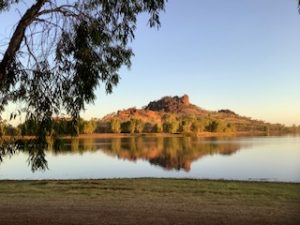
Where is Cloncurry? I hear you ask – 120 kilometres east of Mount Isa. Of course, the day’s activities depend on which day of the week, which month and which Season of the year one is describing… and it’s mulberry time here – and a public holiday! So this morning, after feeding the school chooks, also the Corelas, with Bakery leftovers, and watering the garden, I delighted in thrusting my face into and among the lovely cool, new green leaves of my numerous mulberry bushes, searching out the sweet fruit! Friends make jam, tarts etc – a joy in this drought-stricken area, with Spring temperatures already up to 40°C.
As in many rural ministries, I am the sole Sister remaining, as I was also in Mount Isa while still teaching secondary. In these cases, especially where there is no resident priest, the Sister is very busy doing many different works (not even including housework!). Hence, here I am Parish secretary, treasurer, sacristan, musician, Liturgy planner, visitor of the sick and elderly and taking Communion where needed etc, etc.
I also teach keyboard and guitar, but thankfully most of my pupils over the years, have seen the light and moved on – but five youngsters persist – so at 8:05am Monday – Friday, I teach music.
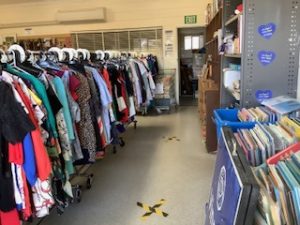
On a Monday, Wednesday, Friday, Saturday mornings, I head for our Vinnies op. shop – the only op. shop in this town of about 3,000 people and in a large area east of Cloncurry.
Ten years ago, I attended a meeting in town, when the Vinnies shop was about to close, and came out as Manager (or Supervisor the technical term!) A learning experience indeed! The work necessary to make the shop a “going concern” then, and currently, takes up many of my waking hours – evidenced by the bags and baskets of Vinnies stuff in this room in the convent, as I write! But I love the work, catching up with the locals and meeting visitors, hearing of problems, providing clothing help for needy children in Mount Isa, men’s groups, and surrounding communities. We, the volunteers and I, delight in preparing and providing great items cheaply for the town and surrounds. P.S. Obviously lacking humility, I will boast that a few visitors have written in our Visitor’s Book: “One of the best op. shops in Australia!”
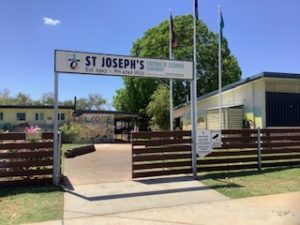
The convent is adjacent to St. Joseph’s Primary and Secondary School, Prep – Year 9, as our Sisters opened and ran the Primary School from 1910 till recently, when lay Principals took over. Indeed, the school can boast that it was the last one founded by Mary MacKillop just before she died. Sr Cecilia, one of Mary’s nurses, was one of Cloncurry’s founding Community of Josephites.
I am often asked by the teachers here, to speak to their class on various topics e.g. Mary MacKillop, Parish life etc – and rocks (I am a retired science teacher, and love rocks!)
Please continue reading below:
A Day in the Life – Rural Ministry (PDF)
Sr Lynette Freestone
View photos of Cloncurry in the photo gallery below:
Rural Ministry
The Constitutions of the Sisters of Saint Joseph reminds us that Mary and Julian in founding the Congregation were responding to needs they perceived in the ‘misery and wretchedness’ of the ‘bush children’ and ‘the afflicted poor’.
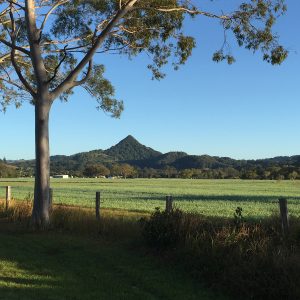
In the book, Ten Years in the Bush, 1866 we read that Julian “thought it (Penola) was a very pretty, retired spot for a township, with a sedate air of prosperity upon it, which became its small dignity immensely well. I counted the houses … there were exactly thirty-seven of them, but I include in that enumeration such outbuildings as stables …”
Rural Ministry goes to the heart of who we are as Sisters of Saint Joseph and those who minister with us in isolated communities scattered across Australia and beyond. Like Mary and the early Sisters, I endeavour to go wherever the poor, neglected little ones live, to share their poverty and way of life and to make human dignity a reality for them. For me living and ministering in the Riverina and before that in the beautiful hinterland of northern New South Wales a word that describes rural ministry is Presence – admittedly, a word that is overused and misunderstood. For me the ministry is about being – being with the people, experiencing a little of their daily life, their joys and challenges, being available to listen and engage, to support in times of new life, hardships of drought, sorrow of death; visiting people in their homes or meeting them for a cuppa in the local and only coffee shop; gifting others with a welcoming place in which to gather, to talk, to be heard, to share and to rejoice and to live the Gospel with a hope that embraces all.
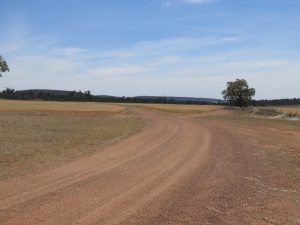 On a practical level an image that comes to me is that of a sunflower that follows the path of the sun. It is the Son that draws forth my gifts to listen, to lead, to pray, to console and to offer a prayer in times of need as well as when gratitude overflows into words of praise and thanks.
On a practical level an image that comes to me is that of a sunflower that follows the path of the sun. It is the Son that draws forth my gifts to listen, to lead, to pray, to console and to offer a prayer in times of need as well as when gratitude overflows into words of praise and thanks.
Days in the week revolve around people – the parishioners, the locals, the children, the bereaved, and those associated with community activities e.g. monthly senior’s luncheon or the fund raisers for everything that occurs from Can Assist to the local show, Lions Club, Mary Gilmore Festival, Museum etc.
Planning for and participating in ecumenical events flows from the meetings with the local churches e.g. APCAT, Ariah Park Churches Acting Together and ACAT – The Ardlethan Churches. These group come together for combined liturgies, lead local school church services e.g. Christmas, Easter and Education Week and provide SRE (Special Religious Education) in the local schools…
Please continue reading below:
Maureen McDermott rsj
Provided are photos in the gallery below:
In the Footsteps of Mary MacKillop
For the past twenty-five years, the Sisters of Saint Joseph have invited people to participate in the ‘Australian National Pilgrimage: In the Footsteps of Mary MacKillop.’
Unfortunately they have not been able to offer this opportunity of journeying with Mary in 2020.
Mary reminds us that ‘We are but travellers here.’
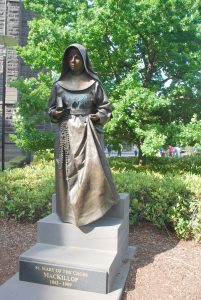
You are invited to read and reflect on the following article ‘St Mary MacKillop – The Pilgrim’, written by Mary Cresp rsj.
The theme of journey was never far from the thoughts of Mary MacKillop.
As the words printed around her tomb remind us, she saw life as a journey. Remember we are but travellers here, she said. The many journeys that made up her life were both actual and metaphorical. Perhaps one expressed the other. From the time Mary was a little girl moving from one relative to another to when, in her last years, she was confined to a wheelchair, she was still ‘on her way’ towards that intimacy with God that ‘heaven’ represents.
When we go on a pilgrimage, we have to ‘let go’ of the certainties of life as it has been. We have to be open to receive the unknown and to receive the hospitality of others. Mary MacKillop’s attitude to God was like that. She learnt to be open at all times to what God wanted to do in her – she called that ‘doing God’s Will’. It meant letting go of personal hopes and ambitions, entrusting them into God’s hands. With gratitude she accepted the hospitality of others – when she was vulnerable, as she was during her journeys overseas. Our journey, too, has involved a letting go that will continue into old age and finally at death, when we enter into our final journey. During our Mary MacKillop pilgrimage we can join with her as, following her footsteps, we open ourselves to receive with gratitude God’s bounty in the hospitality of others.
A pilgrim has to ‘live into the now’. Because we can’t guarantee what lies around the corner, we have to learn what it means to live life fully where we are. Don’t be troubled about the future of the Institute, Mary MacKillop said, I am not. He whose work it is will take care of it. The Gospel of her feast proclaims Jesus’ words: Do not worry about tomorrow … today’s trouble is enough for today. (Mt. 6:34) Being alive to the moment meant that Mary was alert to the needs of her time. The aspect of God’s love characteristic of the charism given her was compassion – God feeling with us in the situation of our lives. Being with another is part of being a pilgrim.
Even if travelling alone, a pilgrim is never independent. We meet others along the way, we depend on them for food and lodging, we are invited to listen to the stories of the people we encounter. In this way we learn of a God who is ever present and who, Mary knew, walks with us each step of the journey…
Reflection on Mary MacKillop
Mary MacKillop could be remembered as a great journalist in her day.
Mary MacKillop’s journals and her letters have left us a plethora of stories of herself, her family, and the early days of the colony when she was such a vital part of the community. She created images of her journeys and her compassion for the poor; we learn of her belief in the importance of education; we imbibe her sense of mission and deep spirituality.
Mary’s diaries give us a great insight into the highs and lows of her life. We learn of her illness, her loneliness, her courage and zeal. From one of her diary entries we feel her pain and sadness as she expresses her emotions in these words:
 Mary and the early sisters used to beg to make ends meet. Throughout these stories of seeking out food, we see her compassion for the sick and the downtrodden. She shared the little they had and sometimes gave her own meal to someone in need. While Mary was a prolific writer, many of her companions left these stories for us by recounting the events that inspired them or humoured them. One such event is the arrival by Mary with a suckling pig to surprise Sr Patrick. Mary notes in her diary – Great amusement over poor piggy.
Mary and the early sisters used to beg to make ends meet. Throughout these stories of seeking out food, we see her compassion for the sick and the downtrodden. She shared the little they had and sometimes gave her own meal to someone in need. While Mary was a prolific writer, many of her companions left these stories for us by recounting the events that inspired them or humoured them. One such event is the arrival by Mary with a suckling pig to surprise Sr Patrick. Mary notes in her diary – Great amusement over poor piggy.
Mary was a progressive woman and even after she suffered a stroke, communication was an important part of her life. She acquired a typewriter and continued to connect with sisters and family. She continued sending spiritual and inspirational messages until the year of her death 1909. In January of that year she gives a heartfelt message to all of us “Do not be afraid. Love one another”. Her final words were a blessing – ‘God bless you all.”
We can only dream of what Mary would achieve if she enjoyed the technology that we are gifted with. We can see her speaking via Video or Webinar. Imagine the texts and the calls as well as the personal visits! However, gratefully and generously Mary utilized every possibility available to her, such was her insight into the power of the word and the necessity for connection and networking. We thank her for her amazing contribution to society and the congregation so dear to her heart.
 Reflection
Reflection
- Our current way of living offers a smorgasbord of technology. Mary MacKillop fostered personal connections in a limited way. How are we using our devices to remember our family members and friends particularly those suffering illness or hardship?
- Humour and surprise were important to Mary MacKillop. How can we bring joy to others in everyday life in simple ways?
- Let us be grateful for the gift of Mary.
Michele Shipperley rsj
Be a Part of History
Purchase a Paver and be a part of History.
St Anthony’s Family Care in Croydon NSW has, for over 60 years, been supporting the local community through the provision of a range of services focusing on the needs of children and families. Their services have changed with the years, but they have always remained true to their mission and to following in the footsteps of Mary MacKillop. Their primary services today, centre around children with disabilities and particularly children with Autism Spectrum Disorder (ASD).
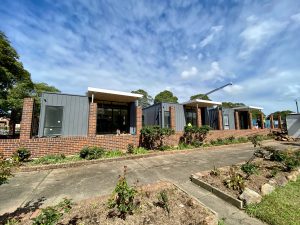
After operating from a site which is close to 100 years old, their buildings were tired, required significant maintenance and were no longer fit for purpose. After many years of planning, a decision was made to construct a new fully accessible and purpose-built village. The facility was designed to consist of an 86-place inclusive Early Learning Centre, three houses for children with disabilities for short term accommodation, an Activity centre for children with disabilities and an Administration building. The new and expanded village would enable St Anthony’s to support a greater number of children to reach their greatest potential.
The Figtree Early Learning Centre, Stage one of the site redevelopment, is now complete with work well underway on Stage two, which includes the new Administration Building, Activities Centre and three respite houses. These houses are now at lock-up stage with only the final fit out to be completed.
You are invited to be part of history by personalising a paver which will be laid on the main pathway running through the site. The expected completion date is March 2021.
 Joanna Najdzion, Chief Executive Officer for St Anthony’s Family Care, said “St Anthony’s Family Care is proud to provide a new Village for children and young people, including young people living with disabilities. Purchasing a paver is a great way to be part of St Anthony’s history and to mark your support of this important project.
Joanna Najdzion, Chief Executive Officer for St Anthony’s Family Care, said “St Anthony’s Family Care is proud to provide a new Village for children and young people, including young people living with disabilities. Purchasing a paver is a great way to be part of St Anthony’s history and to mark your support of this important project.
“The commemorative pavers can contain printed text, a hand-sketched drawing, or a company logo – we invite the public to get as creative as they like to support children and young disabled people in our community,” she said.
Your generous contribution will enable St Anthony’s to complete these state-of-the-art facilities for children and young people accessing the Figtree Early Learning Centre and EPIK Disability Services, where their individualised and group supports are centred around goal driven care for children and young adults.
For further details please visit https://safc.org.au/Appeal/redevelopment-appeal.
Financial Inclusion Program
What does it mean to achieve Financial Freedom.
Financial struggles can cause all sorts of deeper problems in our lives – and it can feel impossible to ever break free. It is crucial to help people in need to stop the cycle of growing debt and take better control of their finances.
For many people, the impact of COVID-19 has brought financial hardship. With widespread job losses and business shutdowns, it means less money in the pockets of people who are desperately trying to make ends meet.
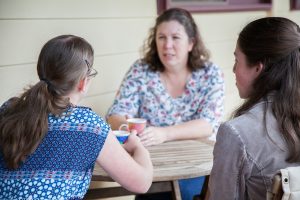 Women have been among the groups particularly affected, as women are generally earning less, saving less, and holding insecure jobs or living close to poverty. Amongst the applications for financial support we received in 2019, 61% were women.
Women have been among the groups particularly affected, as women are generally earning less, saving less, and holding insecure jobs or living close to poverty. Amongst the applications for financial support we received in 2019, 61% were women.
Our Financial Inclusion Program is helping low income earners to move away from financial hardship towards stability and more meaningful economic participation through the delivery of no and low-interest loans in partnership with Good Shepherd Microfinance.
We have identified a significant need to assist individuals in our communities to improve their financial capabilities. We hope to broaden our support through formal financial literacy education – helping people build their financial confidence to approach important areas of life with informed decisions.
As part of our Financial Inclusion Program, we will soon be introducing Financial Literacy Workshops. The purpose of this initiative is to improve financial literacy and reduce vulnerability to predatory lending in rural communities. People involved can learn the skills and knowledge they need to manage their finances more effectively and move into financial inclusion.
This pilot project will be especially important as money management struggles have been heightened during the COVID-19 pandemic, putting many people in financial crisis.
Our Financial Literacy project will be driven by what it means to achieve financial freedom.
This will include helping people learn about how to:
- Improve their financial capability
- Change financial attitudes and behaviour
- Increase financial resilience and confidence
- Improve their ability to meet financial commitments including actively saving
- Change consumer behaviour towards money and credit
- Understand their rights as consumers
With economic dignity in mind, we will help people to understand the options available to them in a safe and respectful environment. We will run financial literacy sessions in a group or one-on-one setting to provide knowledge and skills on managing money day-to-day, making informed choices, and planning for the future.
Improving skills in money management opens up lifechanging opportunities leading to enhanced financial wellbeing. This is especially important for groups of people most vulnerable to economic hardship – such as women, older people, Aboriginal and Torres Strait Islander people, and people living in rural communities.
Our hope is to free people from the distressing impacts of financial hardship.
Mary MacKillop Today’s NILS and StepUP Loans are delivered in partnership with Good Shepherd Microfinance, and is generously supported by NSW Fair Trading, NAB and the Australian Government Department of Social Services.
Kelly Vance
Direct Marketing Officer
Mary MacKillop Today
Image: Mother and two teenage daughters sitting together talking by Clare Seibel-Barnes. Purchased from Austockphoto. Used with permission.

